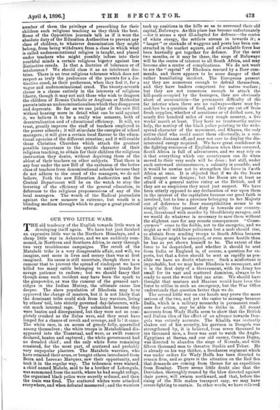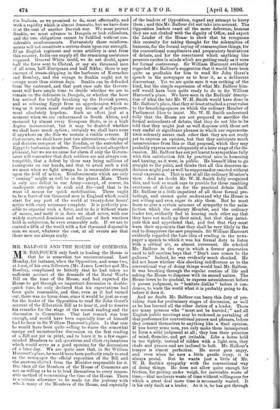OUR TWO LITTLE WARS. T HE old tendency of the English
towards little wars is developing itself again. We have but just finished an expensive little war in the Northern Himalaya, and a cheap little war in Asbantee, and we are suddenly sum- moned, in Northern and Southern Africa, to carry through two very troublesome campaigns. The revolt of the Matabele tribe is a very disagreeable affair, and will, we imagine, cost more in lives and money than was at first imagined. Its cause is still uncertain, though there is a rumour that to prevent the spread of rinderpest we have killed too many cattle belonging to native kraals for savage patience to endure; but we should fancy that though some such incident may have been the spark to the gunpowder, as was the rumour of the greased cart- ridges in the Indian Mutiny, the ultimate cause lies deeper. The slave population of Rhodesia may have approved the change of masters, but it is not likely that the dominant tribe could sink from lazy warriors, living by others' toil, into strictly governed day-labourers, with- out much internal rage. They submitted because they were beaten and disorganised, but they were not so com- pletely crushed as the Zulus were, and they must have longed for a chance of revolt and revenge, and lo! it came. The white race, in an access of greedy folly, quarrelled among themselves ; the white troops in Matabeleland dis- appeared into the Transvaal, and were, as swift rumour declared, beaten and captured ; the white government had no dreaded chief ; and the only white force remaining consisted, for the most part, of scattered and probably very unpopular planters. The Matabele warriors, who have retained their arms, or bought others introduced from Beira and Lorenzo Marquez, saw their opportunity, and took it in the regular way. The tribesmen were warned, a chief named Mabele, said to be a brother of Lobengula, was summoned from the north, where he had sought refuge, the organised black police were secretly seduced, and then the train was fired. The scattered whites were attacked everywhere, and when defeated massacred ; and the warriors took up positions in the hills so as to surround their old capital, Buluwayo. As this place has become unfortunately —for it seems a spot ill-adapted for defence—the centre of white energy, the settlers stream in towards it ; a " ]sager" or stockade of waggons and posts has been con- structed in the market square, and all available force has been hurriedly got together for defence. For the next two months, or it may be three, the siege of Buluwayo will be the centre of interest to all South Africa, and may become also a centre of complications. We do not want to see the " capital" of Rhodesia. rescued by a Boer com- mando, and there appears to be some danger of that rather humiliating incident. The Europeans present say they are numerous enough to defend themselves, and they have leaders competent for native warfare ; but they are not numerous enough to attack the hill-posts occupied by the besiegers, they are obviously short of ammunition—the permanent difficulty of the far interior when there are no railways—there may by- and-bye be a question of food, and they are cut off from fresh supplies, whether of munitions or of drilled men, by nearly five hundred miles of very rough country, a five weeks' march at least. They have no trustworthy native help, the mutiny of the black police pointing to the wide- spread character of the movement, and Khama, the only native chief who could assist them effectually, is a con- siderable distance off, and may not care to display the dis- interested energy required. We have great confidence in the fighting resources of Englishmen when thus cornered, South Africa is full of adventurers, and we may rely on it that everything which our countrymen can do when moved to their very souls will be done ; but still, under such untoward circumstances, a calamity is possible, and it would be unwise not to strengthen the force in Forth Africa at once. It is objected that if we do the Boers will suspect our designs ; but the Boers are at least as afraid of a general native rising as the British, and if they are so auspicious they must just suspect. We have been utterly opposed to any declaration of war upon them in the interest of the capitalists because our good faith is involved, but to lose a province belonging to her Majesty out of deference to Boer susceptibilities seems to us simply silly. Our present duty is towards our country- men, threatened with murder by bloodthirsty savages, and we would do whatever is necessary to save them without the slightest care for any remote consequences. " Conse- quences" come to the feeble, not to the energetic, and we might as well withdraw policemen lest a mob should rise, as abstain from sending troops to South Africa because Mr. Kruger might be annoyed, or even more hostile than he has as yet shown himself to be. The extent of the force to be despatched, and whether it should be sent from India or England is, of course, a question for ex- perts, but that a force should be sent as rapidly as pos- sible we have no doubt whatever. Such a misfortune is improbable, but we may have Rhodesia to reconquer, and it is the first duty of a Government, with its Army too small for its vast and scattered dominion, always to be ready to meet the worst that can arise. We should have thought that marines and Maxims would have been the force to utilise in such an emergency, but the War Office understands that question better than we do. The second little war on our hands may prove the more serious of the two, and yet the easier to manage because India, which is a. military monarchy in permanent readi- ness for action, may be able to strike in. All recent accounts from Wady Haifa seem to show that the British and Italian idea of the effect of an advance towards Don- gola was entirely accurate. The Khalifs, was instantly shaken out of his security, his garrison in Dongola was strengthened by, it is believed, from seven thousand to ten thousand men, a force was sent to watch the Anglo- Egyptians at Sarras, and our old enemy, Osman Digna, was directed to abandon the siege of Kassala, and with fifteen thousand men to threaten Suakin and Tokar. He is already on his way thither, a Soudanese regiment which was under orders for Wady Haifa has been directed to remain firm, and so grave is the situation on the Red Sea that demands are coming from thence for an expedition from Bombay. There seems little doubt also that the Dervishes, thoroughly roused by the blow directed against their power, will swarm northward, and that, before the rising of the Nile makes transport easy, we may have severe fighting to sustain. In other words, we have relieved the Italians, as we promised to do, most effectually, and with a rapidity which is almost dramatic, but we have done it at the cost of another Dervish war. We must protect Suakin, we must advance to Dongola or look ridiculous, and the two obligations cannot be fulfilled without con- siderable reinforcements. Fortunately those reinforce- ments will not constitute a serious drain upon our strength. If an English regiment and some artillery is sent from this country, India can supply all the remaining assistance required. General White could, we do not doubt, spare half the force sent to Chitral, or say six thousand men of all arms, half Europeans and half Sikhs ; there is any amount of steam-shipping in the harbours of Kurrachee and Bombay, and the voyage to Suakin ought not to occupy more than sixteen days. Suakin can be defended from the eastward, and that port once safe the Govern- ment will have ample time to decide whether we are to remain on the defensive in Dongola, or whether the hour has arrived for totally breaking up the Dervish power, and so releasing Egypt from an apprehension which so long as it exists must render any dream of self-govern- ment absolutely hopeless. Such an effort just at a moment when we are embarrassed in South Africa, and menaced by almost every European State, is in a high -degree inconvenient, but it may be doubted whether we shall have much option ; certainly we shall have none if anywhere on the Nile we sustain a visible reverse. If that occurs, we shall have just two alternatives,—the rapid and decisive conquest of the Soudan, or the surrender of Egypt to barbarian invaders. The outlook is not altogether pleasant, but we see no cause for alarm if only the Govern- ment will remember that dark soldiers are not always con- temptible, that a defeat by them may bring millions of insurgents on our hands, and that to avoid such a risk we must when we fight always be in reasonable strength upon the field of action. Reinforcements which are only " coming" might as well be in the planet Mars. There is only one defect in our Army—except, of course, its inadequate strength in rank and file—and that is its want of means for quick mobilisation. There ought to be a force of ten thousand men in England which could start for any part of the world at twenty-four hours' notice with every necessary complete. It is perfectly pos- sible to organise such a force, and to do it without waste of means, and until it is done we shall never, with our widely scattered dominion and millions of dark warriors held in subjection, be even reasonably safe. If we are to control a fifth of the world with a few thousand disposable men we must, whatever the cost, at all events see that those men are always ready.



































 Previous page
Previous page